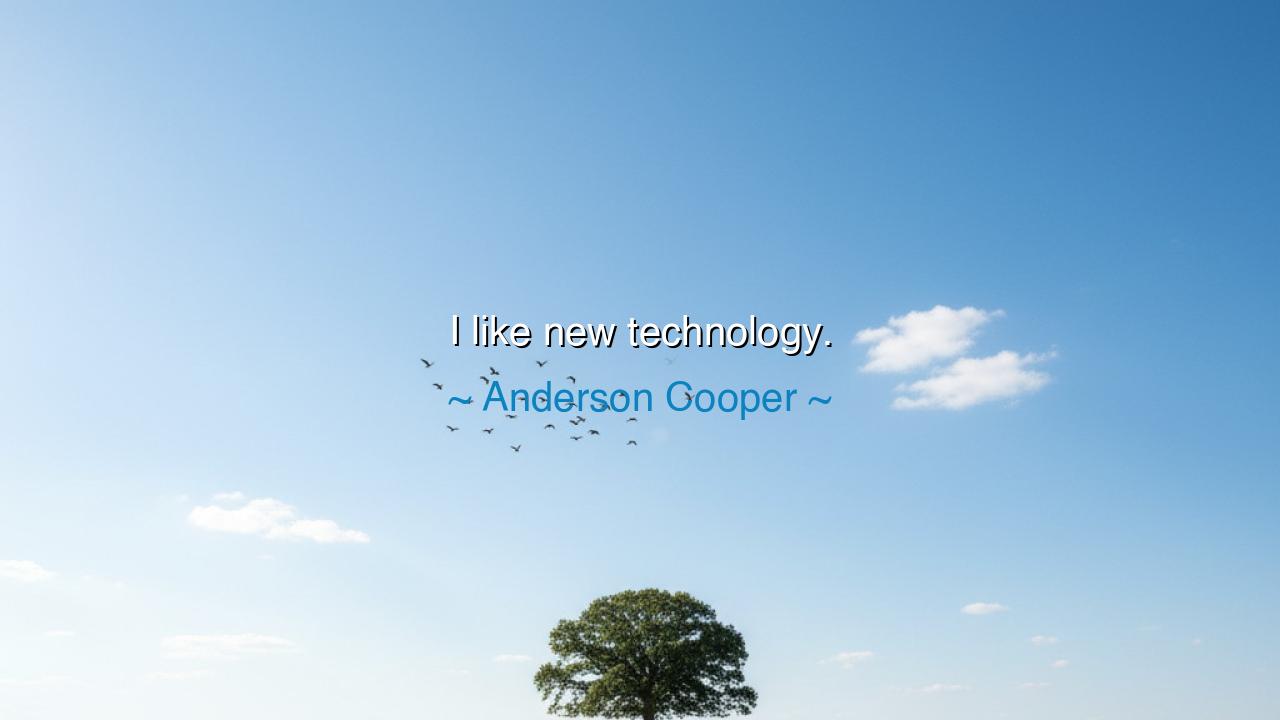
I like new technology.






Anderson Cooper, a voice of our age, once spoke with simplicity that concealed a greater truth: “I like new technology.” At first, these words may seem light, like the casual remark of a man surrounded by gadgets. Yet, upon reflection, they carry the weight of a timeless teaching. To like new technology is not merely to enjoy devices of metal and glass—it is to declare an openness of spirit, a willingness to embrace the future, and a courage to step into the unknown. For the heart that greets novelty with welcome will never wither in fear, but will continue to grow with each rising dawn.
The ancients too had their “technologies,” though of stone and bronze rather than silicon and code. When the wheel was first shaped, or when fire was first tamed, those who said “yes” to these new wonders became masters of their age, while those who clung only to the old ways were left behind in the shadows of history. To say, “I like new technology,” is to echo the spirit of the first smiths and builders, those who gazed upon strange inventions and saw not threat, but opportunity. Such words are not shallow preference, but a hymn to human progress.
Consider the tale of Johannes Gutenberg, who in the fifteenth century brought forth the printing press. Many resisted it, clinging to the old ways of script and parchment, fearing the spread of knowledge beyond the control of the few. Yet those who embraced the press, those who said, “Yes, I like this new craft,” unleashed an age of learning that would light the fires of the Renaissance and the Reformation. Cooper’s words remind us of this same principle: to delight in new technology is to delight in the expansion of human possibility.
But let us not be deceived: liking new technology does not mean surrendering blindly to it. Just as a sword in the wrong hands can bring ruin, so too can machines, if wielded without wisdom. The lesson hidden in Cooper’s phrase is that the love of innovation must be matched by discernment. To admire is not enough; one must also guide, shape, and use wisely. The ancients would say: “A tool without virtue is a danger; but a tool in the hands of the just is a blessing.” Thus, Cooper’s liking is not childlike fascination, but the mark of one who sees both promise and responsibility.
In truth, this liking of new technology is also a declaration of humility. For to embrace the new is to admit that the world is always larger than one’s knowledge, that there will always be discoveries beyond one’s grasp. It is the arrogant who reject what is new, fearing it will expose their ignorance. It is the wise who say, “I like it,” and lean forward into the mystery, eager to learn, eager to be reshaped. Cooper’s words, then, are not only about machines—they are about the posture of the soul toward change.
From his life as a journalist, we see how this openness serves him. In war zones, in disaster-stricken lands, he has relied on new technology to transmit truth to the world: cameras that pierce the dark, satellites that carry signals across oceans, networks that spread news faster than fire. Without such tools, his voice would be but a whisper. By liking them, by embracing them, he honors the truth that technology, rightly used, becomes the servant of justice and the herald of knowledge.
So, dear listener, take this teaching as your own: do not fear the new. When the strange tool is placed before you, do not recoil; instead, ask how it might serve the good. Cultivate not blind fascination, nor blind rejection, but a spirit of curiosity and discernment. Say, with Cooper, “I like new technology,” and let it remind you to remain young in heart, ever ready to adapt, ever ready to learn. For the world will never cease its changing, and only those who embrace its gifts with wisdom will thrive amidst the storms of time.
Thus, the lesson endures: to like new technology is to like the unfolding of the future itself. It is to say “yes” to growth, to courage, to hope. And those who can keep saying yes, with patience and wisdom, will forever walk at the edge of discovery, shaping tomorrow with steady hands and open hearts.






AAdministratorAdministrator
Welcome, honored guests. Please leave a comment, we will respond soon